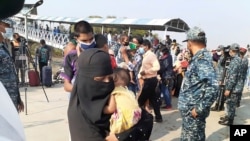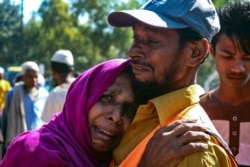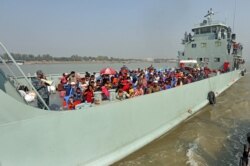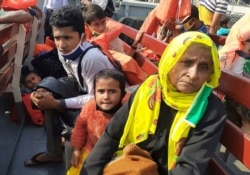The Bangladesh government has begun sending some Rohingya refugees to the controversial Bhasan Char island, despite calls from human rights groups to halt the process.
Seven Bangladeshi navy and army vessels carrying more than 1,600 Rohingya refugees from Cox's Bazar refugee camps arrived Bhasan Char on Friday afternoon. Two other boats carried food and other provisions for the refugees who are moving to the island Friday.
A government official who did not want to be identified told VOA that several thousand more refugees are in the process to be relocated to Bhasan Char within coming days.
"We hope to succeed to relocate around 2,500 refugees to Bhasan Char in this phase. We are sure several thousand refugees will finally move to Bhasan Char in the coming weeks or months," the official said.
Foreign Minister A.K. Abdul Momen, said Thursday that no refugee is being coerced to move to Bhasan Char.
"Only those refugees who have voluntarily agreed to move to Bhasan Char are being relocated to the island. In heavily congested Cox's Bazar refugee camps they face many hardships. They will certainly find life more comfortable in Bhasan Char," he said.
Government officials say relocating the Rohingya refugees to Bhasan Char will ease overcrowding in the camps, which were set up to accommodate the hundreds of thousands of Rohingya, a Muslim minority who fled violence in neighboring Myanmar in 2017.
Several rights groups have called on Bangladesh to halt the process of relocation of the refugees to Bhasan Char and allow an independent expert team to inspect the island for its suitability to host the refugees.
Human rights groups have long argued the island, which was formed naturally by Himalayan silt in the Bay of Bengal, some 60 kilometers from the mainland, is vulnerable to natural disasters and not suitable for human settlement. Human Rights Watch, Amnesty International and Fortify Rights have strongly opposed the relocation of the refugees to the island.
“Bangladesh should halt this hasty relocation process,” said Ismail Wolff, regional director of Fortify Rights. “Not one refugee should be moved until all human rights and humanitarian concerns have been resolved and genuine informed consent is assured.”
Brad Adams, Asia director of HRW said: “The Bangladesh government is actively reneging on its promise to the U.N. not to relocate any refugees to Bhasan Char island until humanitarian experts give a green light. If the government were genuinely confident in the habitability of the island, they would be transparent and not hastily circumvent U.N. technical assessments.”
Some refugees are moving to the island voluntarily, Noor Hossain, a Rohingya community leader from Kutupalong refugee camp, told VOA.
"Some refugees live in very bad shape in Cox's Bazar. They do not have good places to live and they do not get enough food. They hope they will get better support of food and dwelling place in the island. These people are moving to the island," he said.
"They have lost all hope to be able to return to Burma. In such a frustrating situation Bhasan Char is a better place to 'die,' many of them said."







